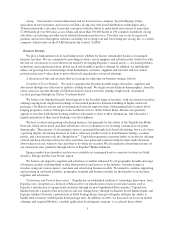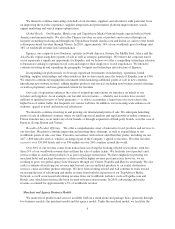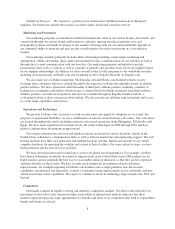Expedia 2010 Annual Report Download - page 18
Download and view the complete annual report
Please find page 18 of the 2010 Expedia annual report below. You can navigate through the pages in the report by either clicking on the pages listed below, or by using the keyword search tool below to find specific information within the annual report.• Diminished ability to legally enforce our contractual rights;
• Increased risk and limits on our ability to enforce intellectual property rights;
• Possible preferences by local populations for local providers;
• Restrictions on, or adverse consequences related to, the withdrawal of non-U.S. investment and earnings;
• Currency exchange restrictions;
• Restrictions on our ability to repatriate cash as well as restrictions on our ability to invest in our
operations in certain countries;
• Exchange rate fluctuations;
• Financial risk arising from transactions in multiple currencies, including our failure to adequately manage
those risks;
• Slower adoption of the internet as an advertising, broadcast and commerce medium in those markets as
compared to the United States; and
• Difficulties in managing staffing and operations due to distance, time zones, language and cultural
differences.
We rely on the performance of highly skilled personnel and, if we are unable to retain or motivate key
personnel or hire, retain and motivate qualified personnel, our business would be harmed.
Our performance is largely dependent on the talents and efforts of highly skilled individuals. Our future
success depends on our continuing ability to identify, hire, develop, motivate and retain highly skilled personnel
for all areas of our organization. In particular, the contributions of Barry Diller, our Chairman and Senior
Executive, and Dara Khosrowshahi, our Chief Executive Officer, are critical to the overall management of the
company. Our future success will depend on the performance of our senior management and key employees.
Expedia cannot ensure that it will be able to retain the services of Mr. Diller, Mr. Khosrowshahi or any other
member of our senior management or key employees, the loss of whom could seriously harm our business.
Competition for well-qualified employees in certain aspects of our business, including software engineers,
developers and other technology professionals, also remains intense.
Our continued ability to compete effectively depends on our ability to attract new employees and to retain
and motivate our existing employees. If we do not succeed in attracting well-qualified employees or retaining or
motivating existing employees, our business would be adversely affected. We do not maintain any key person
life insurance policies.
We have in the past and may again in the future, restructure portions of our global workforce to simplify and
streamline our organization, improve our cost structure and strengthen our overall businesses. These changes
could affect employee morale and productivity and be disruptive to our business and financial performance.
Our stock price is highly volatile.
The market price of our common stock is highly volatile and could continue to be subject to wide
fluctuations in response to factors such as the following, some of which are beyond our control:
• Quarterly variations in our operating results;
• Operating results that vary from the expectations of securities analysts and investors;
• Changes in expectations as to our future financial performance, including financial estimates by securities
analysts and investors;
• Rating agency credit rating actions;
• Reaction to our earnings releases and conference calls, or presentations by executives at investor and
industry conferences;
15
























